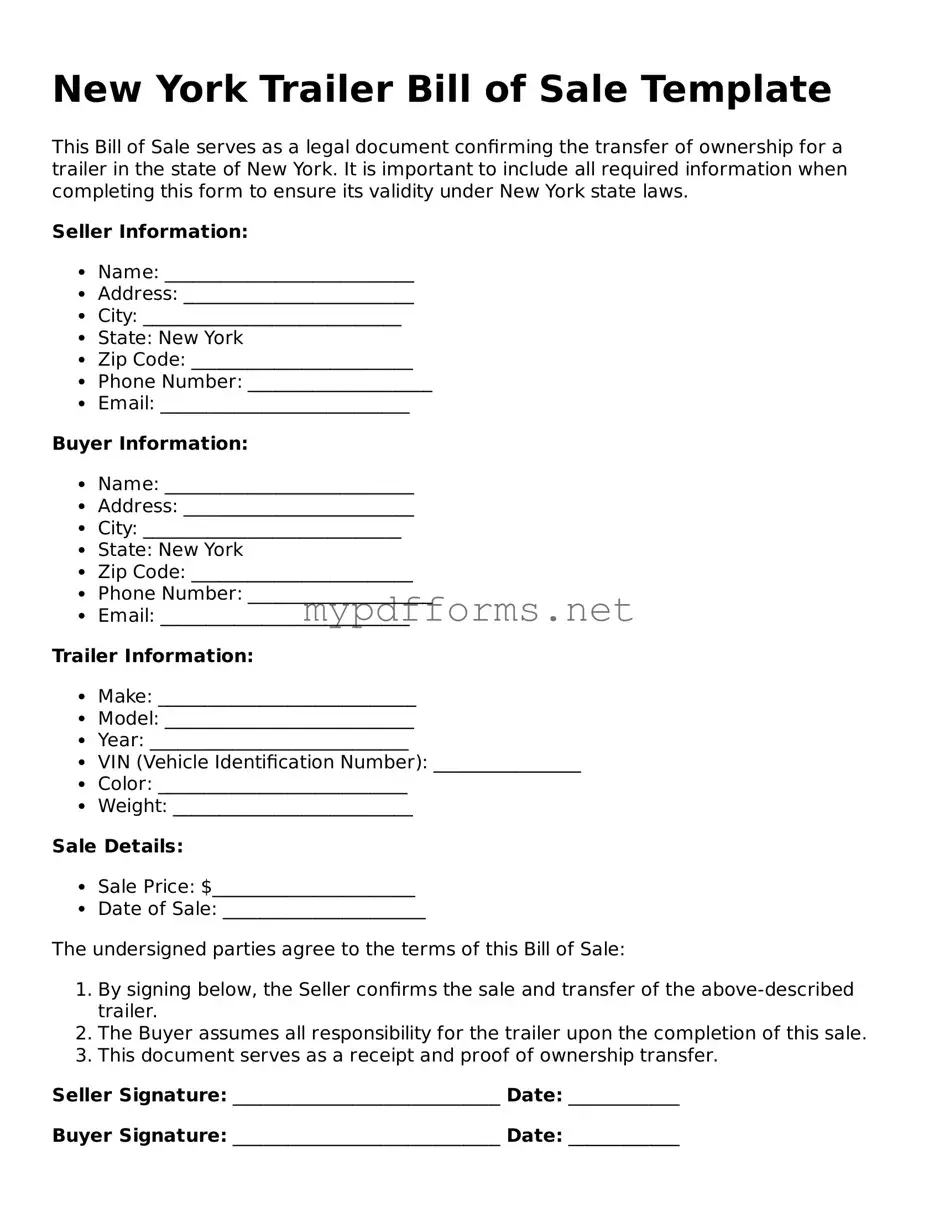The New York Vehicle Bill of Sale is a document that serves a similar purpose to the Trailer Bill of Sale. Both forms are used to transfer ownership of a vehicle, ensuring that the seller provides necessary details about the vehicle, such as make, model, and vehicle identification number (VIN). Additionally, both documents require the signatures of the buyer and seller, which legally binds the transaction. This form is essential for registering the vehicle under the new owner's name and can also be used for tax purposes.
The Boat Bill of Sale is another document that shares similarities with the Trailer Bill of Sale. Like the trailer, a boat requires a bill of sale to transfer ownership legally. This document outlines the specifics of the boat, including its registration number and hull identification number. Both bills of sale protect the interests of both parties by documenting the transaction and providing proof of ownership, which is crucial for registration and potential resale.
The Motorcycle Bill of Sale also parallels the Trailer Bill of Sale in its function. Both documents facilitate the transfer of ownership from one party to another. They include essential details such as the motorcycle’s make, model, and VIN. In both cases, the signatures of the buyer and seller are required, creating a binding agreement that can be referenced in future transactions or disputes.
The RV Bill of Sale serves a similar role as the Trailer Bill of Sale, specifically for recreational vehicles. This document outlines the details of the RV, including its model and VIN. Both bills of sale protect the seller from future liabilities and provide the buyer with proof of ownership. The RV Bill of Sale is especially important for registration purposes and may also be required for financing the vehicle.
The Snowmobile Bill of Sale is another document that mirrors the Trailer Bill of Sale. Both documents are essential for the transfer of ownership of recreational vehicles. The Snowmobile Bill of Sale contains information such as the make, model, and VIN of the snowmobile. Like the Trailer Bill of Sale, it requires the signatures of both parties, ensuring that the transaction is legally recognized.
The Personal Watercraft Bill of Sale is similar in nature to the Trailer Bill of Sale. This document is used for the sale of personal watercraft, such as jet skis. Both forms require detailed information about the vehicle and the parties involved in the transaction. They serve to protect both the buyer and seller by providing a record of the sale and confirming the transfer of ownership.
The ATV Bill of Sale shares common elements with the Trailer Bill of Sale, as both documents facilitate the transfer of ownership for off-road vehicles. The ATV Bill of Sale includes details like the make, model, and VIN, similar to the Trailer Bill of Sale. This documentation is vital for registration and protects both parties in the event of disputes regarding ownership.
The Aircraft Bill of Sale is another document that serves a similar purpose to the Trailer Bill of Sale, albeit for a different type of vehicle. This form is used to transfer ownership of an aircraft and includes essential information such as the aircraft's make, model, and serial number. Both documents require signatures from the buyer and seller, providing a legal record of the transaction that is necessary for registration and compliance with aviation regulations.
The California Dog Bill of Sale form is an essential document for anyone involved in the transfer of dog ownership within the state. Just as various vehicle-related bills of sale serve their specific purposes, this form also ensures that the transaction is legally binding and provides protection for both parties involved. For those seeking a reliable template, you can find the necessary documentation at Top Document Templates.
The Farm Equipment Bill of Sale is comparable to the Trailer Bill of Sale in that it documents the sale of agricultural machinery. This document outlines the specifics of the equipment, including make and model. Similar to the Trailer Bill of Sale, it requires signatures from both parties, ensuring that the transfer of ownership is legally recognized and documented for future reference.
Lastly, the Mobile Home Bill of Sale is akin to the Trailer Bill of Sale, as both documents are used for the sale of movable properties. The Mobile Home Bill of Sale includes details about the mobile home, such as its VIN and description. Both forms protect the interests of the buyer and seller by providing a clear record of the transaction and confirming the transfer of ownership.

